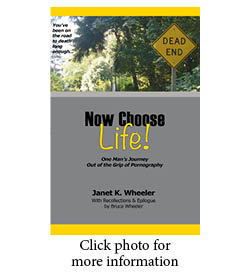There has been a significant amount of debate in recent years about whether sexual addiction is a “real” addiction. Clearly, not all inappropriate sexual behavior is indicative of sexual addiction. Having an affair or occasionally using pornography does not automatically classify someone as a sexual addiction. But, what about those who seem totally out of control and unable to stop? Do they truly have an addiction, or are they just grasping for an excuse to continue their bad behaviors?
To answer that question, it may be helpful to first look at some of the points that have been used to argue against the existence of sexual addiction.
LOW CONFESSION RATE – Although Dr. Patrick Carnes wrote the first book about sexual addiction in 1981, the denial and shame associated with many sexual behaviors have kept people from reaching out and seeking help. Without a clear picture of the potential magnitude and destructive nature of the problem, it’s been easy to discount. Unfortunately, just because something is hidden, doesn’t mean it isn’t there.
CHANGING MORAL STANDARDS – Our social culture regarding sexuality and sexual beliefs is changing. Pornography, affairs and other once-taboo sexual behaviors are increasingly being promoted as normal–even healthy—sexual expressions, in spite of the growing evidence to the contrary. Convincing ourselves that these behaviors are harmless doesn’t change the negative consequences they bring.
INSUFFICIENT CLINICAL RESEARCH – The recent exclusion of sexual addiction from the American Psychiatric Association’s newest version of the Diagnostic & Statistical Manual of Mental Disorders (the DSM-5) has further escalated the controversy. It appears that their reticence was based on the feeling that there was a lack of clinical research to establish the diagnostic criteria and course description needed to identify these behaviors as a mental disorder. It is believed that as more people come forward for help, it’s very likely that more of the studies and trials that the association felt were lacking will be completed.
THE MYTH THAT “ADDICTIONS MUST BE SUBSTANCE BASED” – Many professionals are convinced that only compulsive behaviors involving chemicals are true addictions. They believe that behavioral addictions like gambling, shopping, and sex are more likely a form of obsessive compulsive disorder. Those with this opinion are overlooking the body’s extensive production of hormones during sex that produce the same chemical “high” as drugs or alcohol. Sophisticated new types of brain scans are showing that sexual activity actually lights up many of the same neurotransmitters as using cocaine. Recovering sexual addicts have often even reported an actual physical withdrawal from sex that very closely mirrors the withdrawal from cocaine.
Addiction specialists generally agree that there are four universally accepted indicators—compulsion, obsession, persistence and escalation— that must be present for a substance or behavior to be considered addictive. Although we will look at more closely at how each of these plays into sexual addiction in a future blog post, it is important to note that The National Council on Sexual Addiction and Compulsivity defines sexual addiction as “engaging in persistent and escalating patterns of sexual behavior acted out despite increasing negative consequences to self and others.” This is the description of an addiction in the truest sense of the word.
Contrary to the concern of some, calling compulsive sexual behaviors an addiction, does not provide an excuse for bad behavior. It provides an explanation for behavior that contradicts the morals and values of an individual and a diagnosis that starts to break down the walls of denial and shame and opens up the path to freedom.



Leave A Response